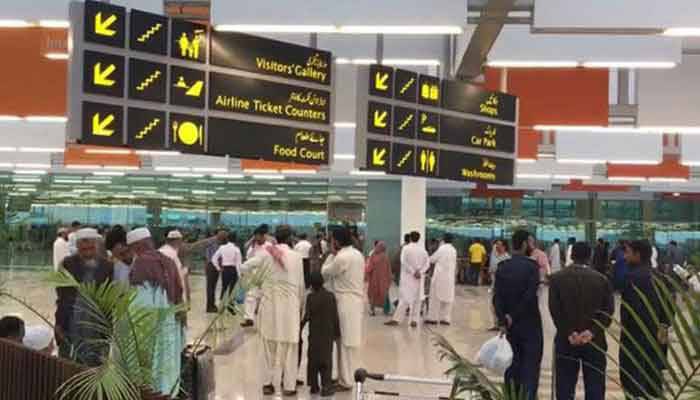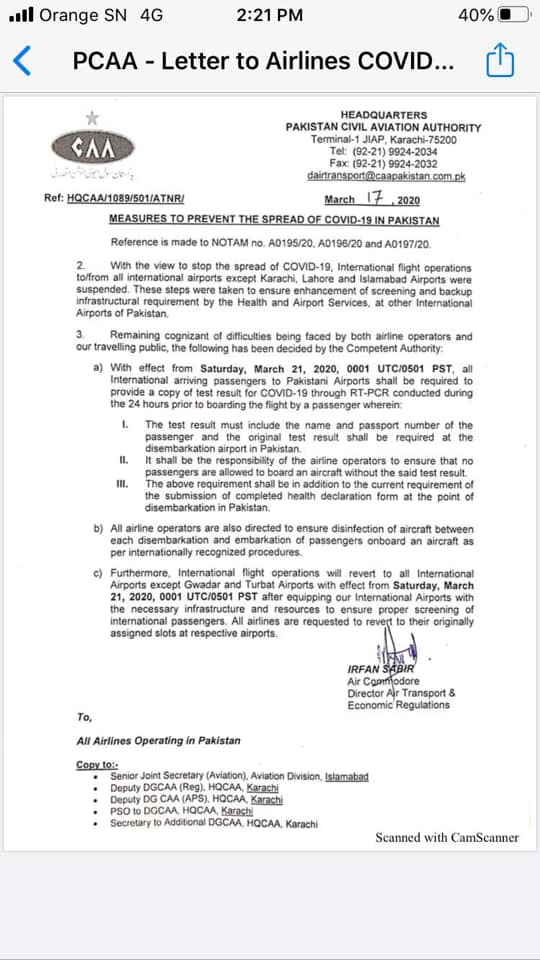
Omer Bhatti and Raza Nazar say the recently announced measure violates the constitutional rights of Pakistani citizens.
The global COVID-19 crisis has prompted various responses from countries. In an order addressed to all airlines operating in Pakistan, the Government of Pakistan has introduced a requirement for every passenger to provide a copy of test result for COVID-19 through RT-PCR conducted during the 24 hours prior to boarding their flight. This requirement will take effect from March 21, 2020.
The Government of Pakistan's blanket requirement for a COVID-19 test results is a draconian measure that contravenes the Article 15 of the Constitution. Under Article 15 (Freedom of Movement), every citizen of Pakistan has the right to enter Pakistan, subject to any reasonable restriction imposed by law in the public interest. The lawfulness of the current measures turn on whether they are “reasonable”.
For a legal requirement to be reasonable, let alone valid, it must be possible for citizens to comply with it. This was one of the famous eight principles in legal philosopher Lon Fuller’s “inner morality of law”; “rules that require conduct beyond the powers of the affected party” would mean that a legal system cannot be properly considered a legal system at all.
In this vein, the governmental measure imposes a requirement that many citizens are unable to lawfully or physically comply with in the country where they are seeking to depart from, given that health testing is offered in exceptionally narrow circumstances. The UK NHS, as reported by the Huffington Post doesn't have “mass testing available for the population right now”. While some have suggested it is still open to citizens to get private testing, this is a false economy. Limited clinics are offering these for rates starting from £375 in the United Kingdom - significantly higher than the purchasing power of many, including local residents. Such unaffordable tests are also offered in limited cases, with continuous delays reported in booking appointments.
The reality of the crisis is that for many Pakistanis seeking to return home, this requirement is impossible to comply with, let alone reasonable. The requirement should be considered void as a law inconsistent with or in derogation of fundamental rights (Article 8), and one that betrays a social contract between the government and its citizens, where there is a basic degree of reciprocity that exists in the observance of rules.
That is not to say that the COVID-19 crisis should not be addressed by decisive measures. The new policy instituted on the 17th of March has most likely resulted from the fallout at the Taftan border where quarantining those entering Pakistan from Iran was handled in a disastrous manner. This quarantine was not enforced properly, the personnel and returnees were in close proximity to each other thereby spreading the disease.
Similarly, those who left the quarantine eventually developed symptoms and were later found to be COVID-19 positive case in point 113 who went to Sukkur, Sindh. Similar reports claim around 720 of those went to Dera Ghazi Khan and have shown symptoms of the Covid 19 disease. However, instead of disenfranchising Pakistani citizens abroad, the government should explore:
A balanced approach is required in times of a global crisis, one that deals swiftly while remaining alive to (and learning from) the international experience while also safeguarding the fundamental rights of Pakistanis.

The global COVID-19 crisis has prompted various responses from countries. In an order addressed to all airlines operating in Pakistan, the Government of Pakistan has introduced a requirement for every passenger to provide a copy of test result for COVID-19 through RT-PCR conducted during the 24 hours prior to boarding their flight. This requirement will take effect from March 21, 2020.
The Government of Pakistan's blanket requirement for a COVID-19 test results is a draconian measure that contravenes the Article 15 of the Constitution. Under Article 15 (Freedom of Movement), every citizen of Pakistan has the right to enter Pakistan, subject to any reasonable restriction imposed by law in the public interest. The lawfulness of the current measures turn on whether they are “reasonable”.
For a legal requirement to be reasonable, let alone valid, it must be possible for citizens to comply with it. This was one of the famous eight principles in legal philosopher Lon Fuller’s “inner morality of law”; “rules that require conduct beyond the powers of the affected party” would mean that a legal system cannot be properly considered a legal system at all.
In this vein, the governmental measure imposes a requirement that many citizens are unable to lawfully or physically comply with in the country where they are seeking to depart from, given that health testing is offered in exceptionally narrow circumstances. The UK NHS, as reported by the Huffington Post doesn't have “mass testing available for the population right now”. While some have suggested it is still open to citizens to get private testing, this is a false economy. Limited clinics are offering these for rates starting from £375 in the United Kingdom - significantly higher than the purchasing power of many, including local residents. Such unaffordable tests are also offered in limited cases, with continuous delays reported in booking appointments.
The reality of the crisis is that for many Pakistanis seeking to return home, this requirement is impossible to comply with, let alone reasonable. The requirement should be considered void as a law inconsistent with or in derogation of fundamental rights (Article 8), and one that betrays a social contract between the government and its citizens, where there is a basic degree of reciprocity that exists in the observance of rules.
That is not to say that the COVID-19 crisis should not be addressed by decisive measures. The new policy instituted on the 17th of March has most likely resulted from the fallout at the Taftan border where quarantining those entering Pakistan from Iran was handled in a disastrous manner. This quarantine was not enforced properly, the personnel and returnees were in close proximity to each other thereby spreading the disease.
Similarly, those who left the quarantine eventually developed symptoms and were later found to be COVID-19 positive case in point 113 who went to Sukkur, Sindh. Similar reports claim around 720 of those went to Dera Ghazi Khan and have shown symptoms of the Covid 19 disease. However, instead of disenfranchising Pakistani citizens abroad, the government should explore:
- Announcing strict quarantine of 14 days for all those entering Pakistan. Taiwan was able to achieve this with great success for all those who entered the country, and is currently sitting at only 58 cases, despite being only 100km away from China.
- Encouraging provincial governments to follow the spirit of the Sindh Government’s efforts and install airport screenings to check for travellers with symptoms.
- Applying emergency spending allowance for the National disaster Management Authority to build quarantine camps. While Pakistan cannot spend 850 billion in local currency unlike the USA to bailout major industries, it certainly can use vast resources in the military budget to build temporary hospitals like the 2000 bed centre in Sindh. Expending political and financial capital are crucial to treating domestic and international cases, and preventing the spread of the infection.
A balanced approach is required in times of a global crisis, one that deals swiftly while remaining alive to (and learning from) the international experience while also safeguarding the fundamental rights of Pakistanis.

